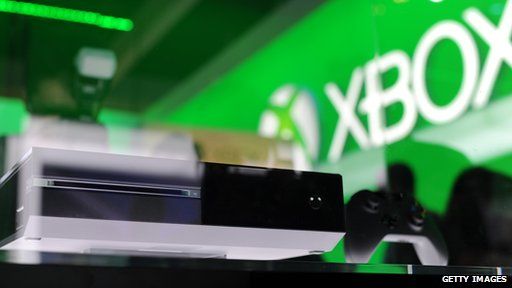Counterfeit Xbox One makers charged in US and Australia
- Published

Four people have been charged in the US and one in Australia for their alleged involvement in a hacking ring that stole pre-release video game data.
Prosecutors have claimed that members of the group managed to use some of the information to create counterfeit versions of the Xbox One console.
One of these is said to have been sold on eBay for $5,000 (£3,085) ahead of the machine's official launch.
US Army helicopter training software is also alleged to have been pirated.
The US Department of Justice said that the value of the intellectual property and other data stolen totalled between $100m to $200m.
It added that two of the suspects - Sanadodeh Nesheiwat, from New Jersey, and David Pokora from Ontario, Canada - had already pleaded guilty to conspiracy to commit computer fraud and copyright infringement.
They face up to five years in jail when a judge sentences them in January.
"Electronic breaking and entering of computer networks and the digital looting of identities and intellectual property have become much too common," said US government lawyer Charles Oberly.
"These are not harmless crimes, and those who commit them should not believe they are safely beyond our reach."
Unreleased games
Court documents state that the computer systems of Microsoft, Epic Games, Valve, Zombie Studio and the US Army were all breached as part of the attacks.
They suggest that this was achieved by a combination of adding code to web applications used by the firms, in what is known as SQL injection attacks, as well as obtaining stolen log-in credentials belonging to the companies' employees, and some of their software development partners.
It is alleged that the accused rented and used computers in the UK, US, Hong Kong, Australia and the Netherlands to commit the crimes in 2011.
Among the files said to have been stolen were:
- the technical specifications and source code for the Xbox One console
- Activision's Call of Duty: Modern Warfare 3 video game
- Epic Games's Gears of War 3 video game
- Square Enix's Thief video game
- Zombie Studios' AH-64D Apache Simulator, which had been created for the US Army
Investigators allege that Nathan Leroux - a 20-year-old from Maryland, subsequently ordered components from online retailers to build a counterfeit version of the Xbox One's development kit.
Court papers state that one copy was sold via eBay in August 2012, and the sale of a second unit was arranged to an individual based in Seychelles the same month,
This latter machine was, however, intercepted by the FBI before it left the US.
The development kit represented a PC loaded with a pre-release version of the Xbox operating system. Legitimate versions of this would have been used by trusted software houses at the time to create and test games for the console.
Microsoft did not formally unveil the Xbox One until May 2013, and it did not go on sale until November.
The papers also note that the Australian alleged to be part of the hacking ring appeared to have spoken about his exploits to the editor-in-chief of the Kotaku news site, who published an article about him last year.
Stephen Totilo reported that as well as having tried to help sell copies of the Xbox One kit, the Perth-based man - who used the nickname SuperDae - had also claimed to have played pre-release versions of Sleeping Dogs 2 and Homefront 2.
The man is reported to have added that he had searched for Half Life 3 on Valve's servers, but had not managed to find anything.
- Published29 September 2014
- Published25 August 2014
- Published13 August 2014